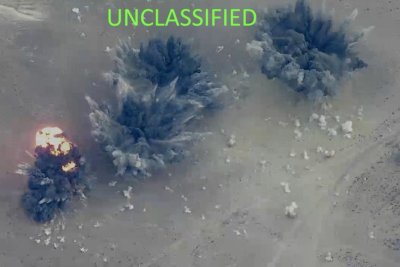U.S. Central Command strikes Islamic State in Syria

U.S. Central Command conducted aerial strikes against more than 30 ISIS targets in Syria from February 3 through Thursday. Photo courtesy of U.S. Central Command
Feb. 14 (UPI) — The U.S. military struck dozens of Islamic State targets in Syria while conducting retaliatory strikes for the deaths of two soldiers and their interpreter.
CentCom said it conducted 10 strikes on more than 30 ISIS targets in Syria from Feb. 3 through Thursday to “sustain relentless military pressure on remnants from the terrorist network.”
The strikes over the past 1.5 weeks targeted ISIS infrastructure and weapons storage facilities with precision munitions sent by fixed-wing, rotary-wing and unmanned aircraft, CentCom officials said.
The aerial strikes continued U.S. Central Command’s Operation Hawkeye Strike attacks after the Islamic State’s ambush on Dec. 13 that killed two Iowa National Guard reservists, Sgt. Edgar Brian Torres-Tovar, 25, and Sgt. William Nathaniel Howard, 29, and their civilian interpreter, Ayad Mansoor Sakat, 54, who was from Michigan.
Three members of Syria’s security forces also were wounded in the ambush.
“There is no safe place for those who conduct, plot, or inspire attacks on American citizens and our warfighters. We will find you,” CentCom Commander Adm. Brad Cooper said in a statement after U.S. forces killed Al-Qaeda-affiliated Bilal Hasan al-Jasim in January.
CentCom also carried out five strikes against an ISIS communications site, logistics node and weapons storage facilities from Jan. 27 to Feb. 2.
The strikes over the past two months have killed or captured more than 50 ISIS militants struck more than 100 ISIS infrastructure sites with hundreds of precision munitions, according to CentCom.
Syrian forces have helped the U.S. military stop ISIS from rebuilding its infrastructure and capabilities and on Friday transported 5,700 detainees to Iraq, where they will be tried in a court of law.
The move occurred as the U.S. military is lowering its troop count in Syria by evacuating a military base in al-Tanf after a 10-year deployment there.
